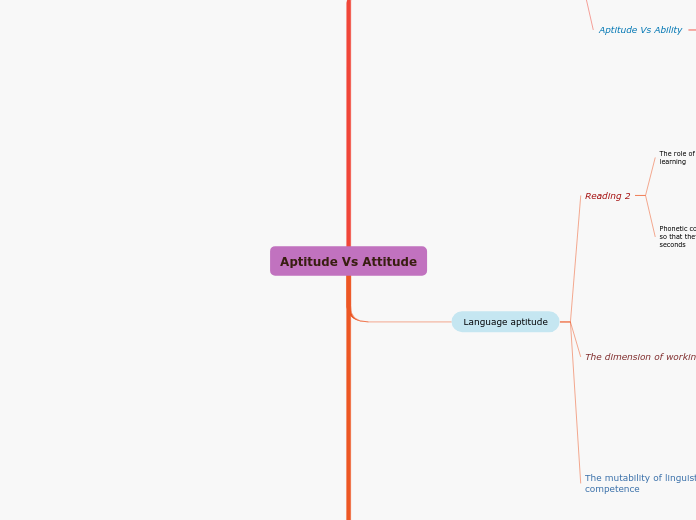Aptitude Vs Attitude
Classification of basic
Reading 1
Foreing language
Aptitud Fl, should be considered a general term consisting of a set of Cognitive skills, which makes it a Componental concept.
Capability can be identified with performance or performance potential.
An ability can be considered a trait to the extent that it exhibits some degree of stability or permanence even over relatively long periods of time.
Aptitude Vs Ability
Aptitude Vs Intelligence
We found that first-order factor analysis of the aptitude and intelligence scores confirmed that they were separate
Other aptitude factors in Carroll's original model (1962, 1981), such as phonetic coding ability and memory,
do not correlate with intelligence
"logro y apttitud
Carroll defined FL proficiency as "an individual's initial state of readiness and ability to learn a foreign language, and likely ease of doing so
Capability can be identified with performance or performance potential.
Aptitude" is a notion that is synonymous with "ability".
Language aptitude
Reading 2
The role of foreign language proficiency in language learning
Grammatical sensitivity, the ability to identify the functions of words in sentences.
Grammatical sensitivity, the ability to identify the functions that words serve in sentences; Inductive language learning ability, the ability to take a corpus of material in a target language and make extrapolations (i.e., generalizations) from that material.
Phonetic coding ability, the ability to encode sounds so that they can be retained for more than a few seconds
Modern language proficiency tests (and their LLAMA derivatives) have been widely used for decades and, in essence, are still in use; some would no doubt argue that this demonstrates proof of their value.
Grammatical sensitivity, the ability to identify the functions of words in sentences
functions of words in sentences;
The dimension of working memory
Phonemic coding ability, the ability to encode sounds so that they can be retained for more than a few seconds.
They also share a conception of working memory as a construct of limited capacity, whose efficiency may vary widely from one individual to another. It is generally assumed that working memory comprises multiple components.
There are some differences between the current
models of working memory, but they have points in common with respect to the conceptualization of this construct and the account given of its processes.
Working memory, like language aptitude, "has traditionally been viewed as a 'trait,' a relatively fixed ability that increases in a predictable and maturation-constrained manner as children grow older.
Modern language proficiency tests (and their LLAMA derivatives) have been widely used for decades and, in essence, are still in use; some would no doubt argue that this demonstrates proof of their value.
Associative memory, the ability to form links between words in the native and foreign language
The mutability of linguistic competence
There are increasing indications and claims that such aptitude is not an unalterable endowment present from birth, or not just something that is innate and unalterable, and that, at least to some extent, awareness arising from experience and training impacts on it.
Linguistic aptitude has been broadly defined de facto for decades in terms of the instruments used to investigate it.
Aptitude en lenguas
• Nivel más alto: es la capacidad mental general
• Nivel intermedio: la analítica fluida, la verbal cristalizada y la capacidad de visualización espacial. (Abarca tres capacidades)
• Nivel más bajo: constituido por capacidades más específicas, las cuales no se precisan.
La prueba de medición de rendimiento en lengua inglesa como lengua extranjera, es estandarizada para la medición del aprendizaje de la lengua inglesa en el desempeño de habilidades específicas.
• Denominado amplio: capacidades muy generales que se apoyan en dominios
• Denominado cerrado: capacidades que reflejan efectos de experiencia y aprendizaje.
